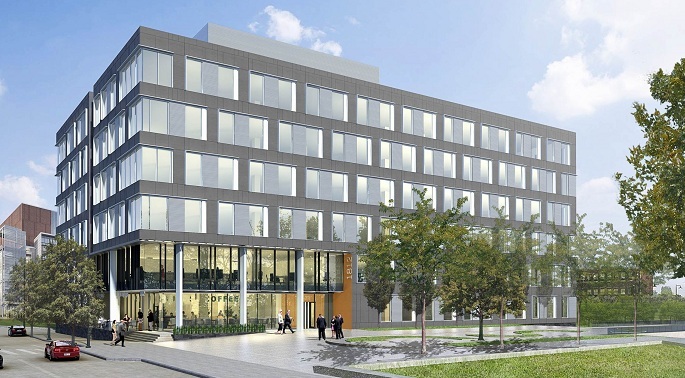Johns Hopkins University officials have been talking about putting more energy into fostering more entrepreneurship among the Baltimore institution’s vast research megalith. This week, they put a plan in writing.
On Wednesday, Hopkins President Ronald J. Daniels released a 20-page report that lays out plans for $40 million in new investment over five years. Officials want the new money to fuel the growth of an “innovation ecosystem.”
Read the report
With the university’s wide reach in Baltimore and the connections to the private sector that the new initiative looks to forge, the plan has all sorts of implications for Baltimore’s tech community.
Daniels has openly talked about how the university could do more to encourage entrepreneurship and commercialization of the innovations that are already being developed by faculty and students.
Signs of a renewed commitment have been popping up this year, like the opening of a new branch of the university’s FastForward incubator near the JHU medical school. But the new plan lays out a fuller road map. Given the money involved and Hopkins’ increasing influence over Baltimore’s startup scene through investments in programs like DreamIt Health Baltimore, you can ignore it at your own risk.
The document charges Johns Hopkins Technology Ventures with the task of putting the plan into action. Here’s a look at the three main areas JHU wants to focus on:
1. Physical space
The plan calls for $15 million to create a physical space for an incubator, specifically located in East Baltimore. As we mentioned, the university just opened a new FastForward location that does just that.
But officials have even bigger plans.
The plan is to move FastForward East into a new, seven-story building at 1812 Ashland St., which is just a stone’s throw from its current location. The building will be one of the anchors of the university’s science and technology park. It’s within walking distance of JHU’s medical school and hospital, where much of the research that is fit to commercialize takes place.
Since it’s run by the same people who run the original FastForward incubator at the Homewood campus, the idea is that it integrates fully into the university, and is made available to students. Entrepreneurs who aren’t directly connected to the university are also eligible to move in.
2. Money
The plan calls for $10 million to provide funding for early-stage companies that arise from university research.
Most of that money would be used for a grant program that invests in university-connected companies that have yet to complete a seed round. The idea is that the fund would replenish itself as the university makes money back as companies become successful. The university is also going to start providing grants to undergraduate students, and create a position designed to connect students with startup aspirations to university resources.
The plan also includes talk of starting an investment fund targeted at university startups that’s run by an outside manager (MentorTech Ventures at the University of Pennsylvania is a similar effort), but money for that program isn’t included in the $40 million.
3. Connecting points
Being a huge institution, there’s a lot of bureaucratic change required if the university is going to fully realized its plan. The plan lays out a host of changes, including:
- Creating a network of experts in entrepreneurship that university startups can rely on
- Starting an entrepreneurs-in-residence program
- Creating a “one-stop front door” to the university’s startup efforts for people from inside and outside the university
- Expanding on existing education programs like JHU’s entrepreneurship boot camp, and the school’s relationship with the National Science Foundation I-Corps program.
There’s also plans to create a Commercialization Academy that would help provide skills to students who want to start a business.







